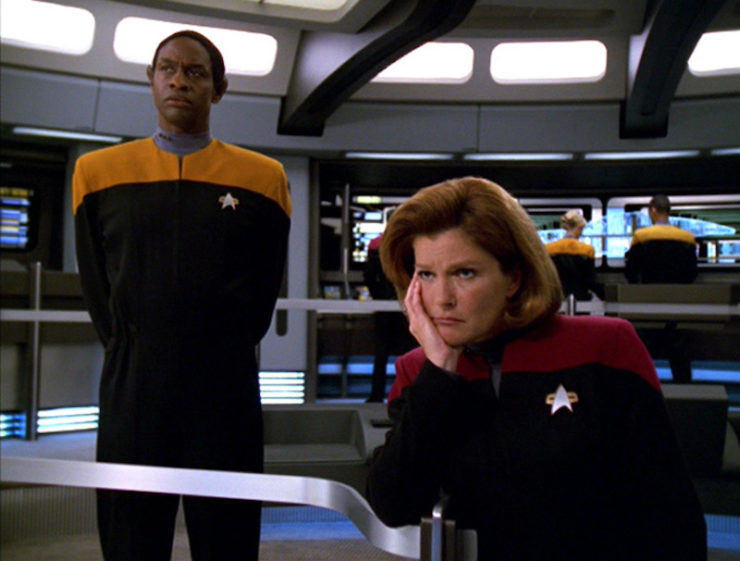Star Trek: Voyager Seventh Season
Original air dates: October 2000 – May 2001
Executive Producers: Rick Berman, Kenneth Biller
Captain’s log. As with both TNG and DS9, Voyager went into its seventh season fully aware that it would be their last year on the air. To that end, several episodes were done with the notion that the show was ending in mind.
Like the two show-runners before him (Jeri Taylor and Michael Piller), Brannon Braga stepped back to the role of consulting producer, with Kenneth Biller taking over the show-running duties. One thing Biller tried to do was address certain outstanding issues, or at least revisit themes that hadn’t been dealt with in a while.
Characters such as Q, Joe Carey, Vorik, the Borg Queen, and the Hirogen were all brought back. Neelix was given closure in the antepenultimate episode, being unconvincingly reunited with a bunch of Talaxian refugees in “Homestead.” Torres and Paris got married in “Drive” and had a kid in “Endgame.” Three of the Borg kids found homes while the fourth, Icheb, got to give up his cortical node to help Seven and also become a long-distance Starfleet cadet in “Imperfection”; Icheb’s studies would continue throughout the season. The Emergency Command Hologram makes a couple of return appearances in the “Workforce” two-parter and “Renaissance Man.”
The Maquis-Starfleet tension that was supposed to be the spine of the show was revisited one last time in “Repression.” The contact with the Alpha Quadrant that started in the sixth season’s “Pathfinder” continued throughout the seventh, most notably seen in “Inside Man,” “Author, Author,” and “Friendship One.” Several moments from the show’s past are revisited in “Shattered.” And there are a couple of encounters with other AQ folks, including Ferengi, Klingons, and an old probe—not to mention some holographic versions of familiar species in “Flesh and Blood.”
And then the ship finally gets home thanks to time-travel shenanigans in “Endgame.”
Highest-rated episode: a tie among “Critical Care,” “The Void,” and both parts of “Workforce,” all with a 9.
Lowest-rated episode: “Endgame” with a 1. Dishonorable mention to “Unimatrix Zero, Part II,” “Repression,” “Nightingale,” and “Q2,” which all received 2s
Most comments (as of this writing): “Endgame” with more than 120—it’s still getting comments, so a precise number isn’t possible, but it’s also the only one of the seventh-season episodes to break three figures in comments. Not surprising, really.
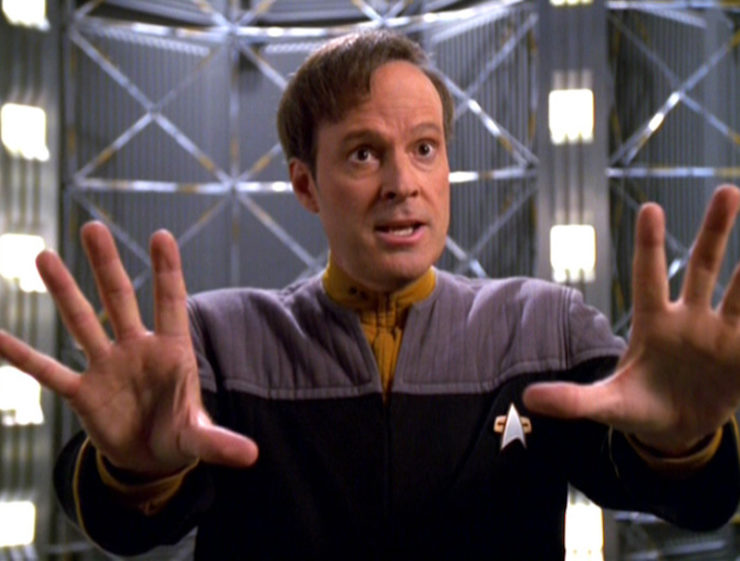
Fewest comments (as of this writing): “Inside Man” with 22. Nobody wants to talk about poor holo-Barclay…
Favorite Can’t we just reverse the polarity? From “The Void”: Paris is confused as to why their deuterium is stolen, as it’s incredibly common and can be found anywhere. He says this is a “duh” tone of voice, as if it should be obvious to anyone. This is the show’s way of apologizing for the abject stupidity of “Demon” with Voyager struggling to find deuterium, which is an isotope of hydrogen, the most common element in the universe.
Favorite There’s coffee in that nebula!: From “Imperfection”: After being completely willing to kill Tuvix to restore Tuvok and Neelix, after being completely willing to disregard Torres’ very explicit instructions not to allow herself to be treated by Crell Moset, Janeway is inexplicably absolutely unwilling to go against Seven’s wishes to receive a cortical node transplant from Icheb.
Favorite Mr. Vulcan: From “Body and Soul“: Tuvok refuses to even admit that he is suffering from the pon farr until Paris comes out and guesses it. He does the stubborn-ass Vulcan stoic thing to the very end.
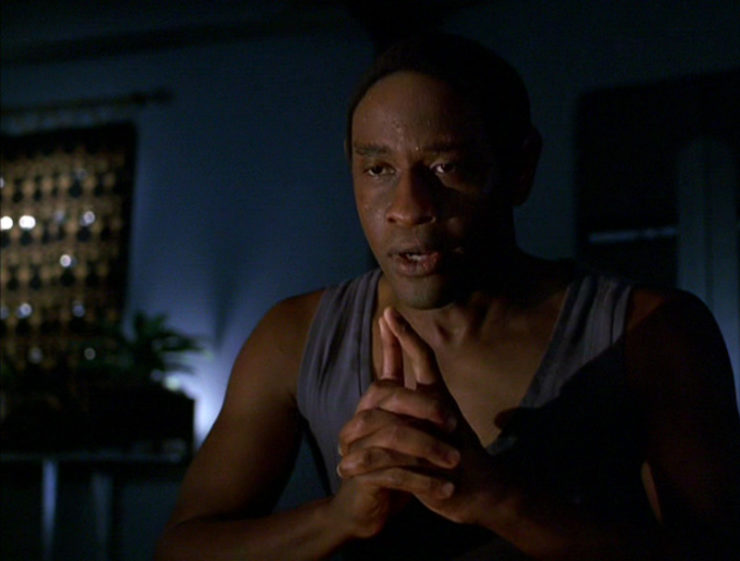
Favorite Half and half: From “Author, Author”: The single greatest (and funniest) moment in the entire episode is when Torres is doing the holo-novel and Lieutenant Marseilles walks into sickbay, and she gets a look at her husband’s face with a mustache on it, and she cracks an amused smile for just a second before getting back into character. It’s a beautiful moment, played perfectly by Roxann Dawson and director David Livingston.
Torres also speaks to her father for the first time since he walked out on her and her mother. It’s a magnificent combination of awkward and sweet.
Favorite Forever an ensign: From “Endgame”: In 2404, Kim finally got promoted, all the way to captain! In 2377, he goes from whining about not checking out the nebula—even trying to inveigle Paris to go with him in the Delta Flyer to investigate more covertly—to giving a speech how it doesn’t matter when they get home, as long as the family stays together.
Favorite Everybody comes to Neelix’s: From “Q2”: Neelix, claiming to be good with children, tries to talk to q, who rewards him by sealing his mouth shut and removing his vocal cords, thus thrilling a subset of fandom who hates Neelix. Later, after Q restores him, Neelix makes it a point to babble even more than usual whenever he’s in Q’s presence, which is actually quite delightful.
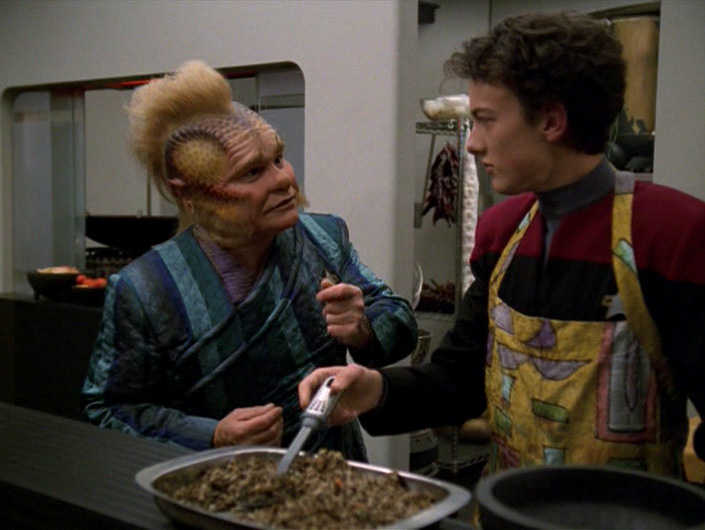
Favorite Please state the nature of the medical emergency: From “Renaissance Man”: The EMH waxes rhapsodic at the top of the episode about how awesome it is to be a hologram because of all the cool things he can do, and then he spends much of the episode doing some of those cool things.
Then at the end, he confesses to Tuvok that he violated doctor-patient confidentiality by telling Neelix about a delicate medical issue the Vulcan had; to Kim that he once said mean things about his saxophone playing; to Seven that he loves her; and to Janeway that when he was first activated, he compiled a list of what he felt were questionable command decisions of hers.
Favorite Resistance is futile. From “Nightingale”: Seven, who has absolutely no command experience whatsoever, lectures Kim repeatedly about how to be a better commander. Maybe she stayed at a Holiday Inn Express last night…
Favorite Rules of Acquisition: From “Inside Man”: We get a new Rule in #74, which is “Knowledge equals profit.”
Favorite What happens on the holodeck, stays on the holodeck: From “Human Error“: The holodeck has already proven able to make Torres into a pregnant woman, so I guess it makes sense that it can get rid of Seven’s Borg implants for the duration of the program…
Also Seven comes up with overwhelmingly generic and clichéd gifts for her holodeck scenarios: a logic puzzle from the guy who values logic; a diaper from the youngest guy in the bridge crew; and a dream catcher from the Indigenous dude. Sigh.
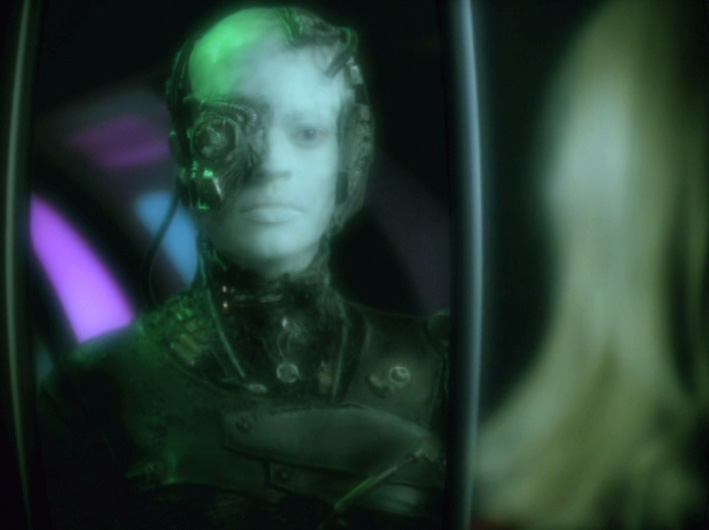
Favorite No sex, please, we’re Starfleet: From “Body and Soul”: Let’s see, Ranek has the hots for Seven, the EMH has the hots for Jaryn, and Jaryn has the hots for Ranek. Cha cha cha. Also Tuvok really misses his wife right around now…
Favorite Welcome aboard: This season has a bunch of recurring regulars for their last hurrah on the show: Manu Intiraymi as Icheb, Marley McClean as Mezoti, Kurt & Cody Wetherill as Azan and Rebi, Derek McGrath as Chell, Jad Mager as Tabor, Dwight Schultz as Barclay, Marina Sirtis as Troi, Richard Herd as Owen, Richard McGonagle as Harkins, Marva Hicks as T’Pel, Martin Rayner as Dr. Chaotica, Nicholas Worth as Loznak, Martha Hackett as Seska, Scarlett Pomers as Naomi, Juan Garcia as John Torres, John deLancie as Q, Josh Clark as Carey, Tarik Ergin as Ayala, and Alexander Enberg as Vorik.
The Borg Queen bookends the season, played by two different people who’ve played her before. She appeared at the top in “Unimatrix Zero, Part II” played by Susanna Thompson, who played her in Part I and “Dark Frontier,” and then at the end in “Endgame” played by Alice Krige, who originated the role in First Contact.
In terms of letter-perfect casting, we’ve got Jeff Kober playing a psychotic murderer in “Repentance,” Keegan deLancie (the son of John) playing Q’s kid in “Q2,” Joseph Campanella playing an arbiter in “Author, Author,” and Lisa LoCicero looking very much like she could be the offspring of Roxann Dawson and Robert Duncan McNeill as Miral in “Endgame.” Plus we’ve got James Read (the “Workforce” two-parter) and Julianna Christie (“Homestead”) doing excellent work as romantic interests for, respectively, Janeway and Neelix.
We get some past Trek guests: Brian George, Patrick Kilpatrick, Ciya Batten (all in “Drive”), Gregory Itzin, John Durbin (both in “Critical Care”), Frank Corsentino (“Inside Man”), Megan Gallagher, Fritz Sperberg (both in “Body and Soul”), Paul S. Eckstein (in both “Flesh and Blood” and “Prophecy”), Cindy Katz, Spencer Garrett (both in “Flesh and Blood”), Tim de Zarn, F.J. Rio (both in “Repentance”), Wren T. Brown, Sherman Howard (both in “Prophecy”), Jonathan del Arco (“The Void”), Tom Virtue, Iona Morris (both in “Workforce, Part I”), Robert Ito, Barry Gordon (both in “Author, Author”), Bari Hochwald, John Prosky, Peter Dennis (all in “Friendship One”), Neil Vipond (“Natural Law“), Rob LaBelle, and John Kenton Shull (both in “Homestead”).
Several Robert Knepper moments: Keith Szarabajka (“Repression”), Larry Drake, William Daniels (both in “Critical Care”), Ron Glass (“Nightingale”), Robin Sachs (“The Void”), Don Most (both parts of “Workforce”), and Robert Joy (“Workforce, Part II”).
But the niftiest guest is Vaughn Armstrong, who solidifies himself as the master of Trek guest appearances by making both his seventh and eighth roles on Trek as a Hirogen in “Flesh and Blood” and a Klingon in “Endgame.”
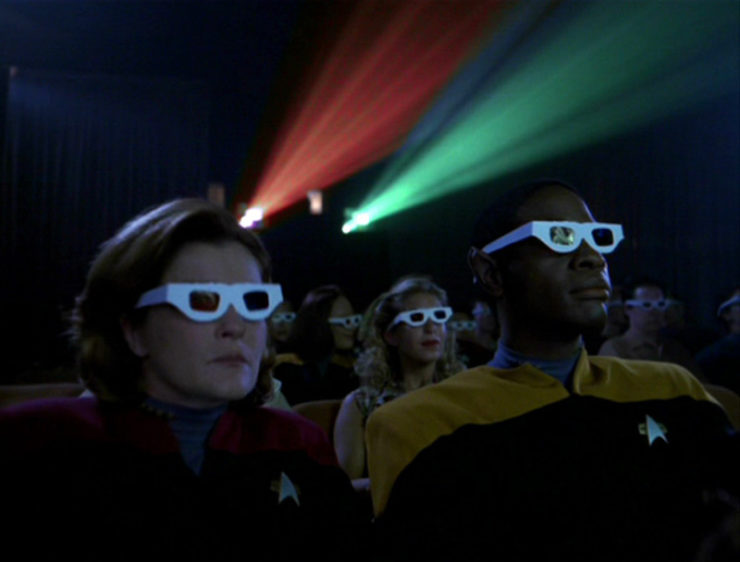
Favorite Do it: From “Repression”:
“Let me get this straight. You’ve gone to all this trouble to program a three-dimensional environment that projects a two-dimensional image, and now you’re asking me to wear these to make it look three-dimensional again?”
–Torres, expressing dubiousness about the whole 3D movie thing
Favorite Trivial matter: The one for “Endgame,” just because there was so much to unpack in that one…
Set a course for home. “Must be something you assimilated.” In many ways, the seventh season of Voyager is the show in a nutshell: there are some very good ideas here, but only some of them are executed well.
While I appreciate that Kenneth Biller tried very hard to address some things that had gone unaddressed, they half-assed it to such a degree that you kind of wish they hadn’t bothered. Plus there was a certain level of not thinking things through that was maddening. Like addressing the Maquis-Starfleet divide in “Repression,” but doing it in a totally absurd way that defies credulity and makes absolutely nothing like sense. Like finally acknowledging the number of casualties among the crew over the past seven years in “Repentance” and “Renaissance Man,” but not actually addressing it in any kind of logical, emotional, or interesting manner. Like continuing to not promote Kim beyond the rank of ensign and repeatedly drawing attention to it and trying to explain it away even though that explanation is inconsistent with both Tuvok and Paris being promoted at various points.
On top of that, the marginalization of the lead character that has been a feature of the show since Jeri Taylor stopped being show-runner continues, as Janeway is barely a presence throughout much of the final season. Voyager was often accused of being the Seven of Nine show from season four onward, and while that exaggerates the case, you can argue that it’s the Seven-and-EMH show, as they get the lion’s share of the episode spotlights and character development.
Meanwhile, the captain and first officer are barely even presences on the show in this last season. It’s incredibly disappointing and, frankly, appalling that the show in the end did so little with the first female captain and the only Indigenous regular character the show has had. In particular, one of the most interesting features of Kathryn Janeway as a character is that she’s a science nerd, and the only time this season that was even really evident was in the “Workforce” two-parter where Janeway wasn’t herself.
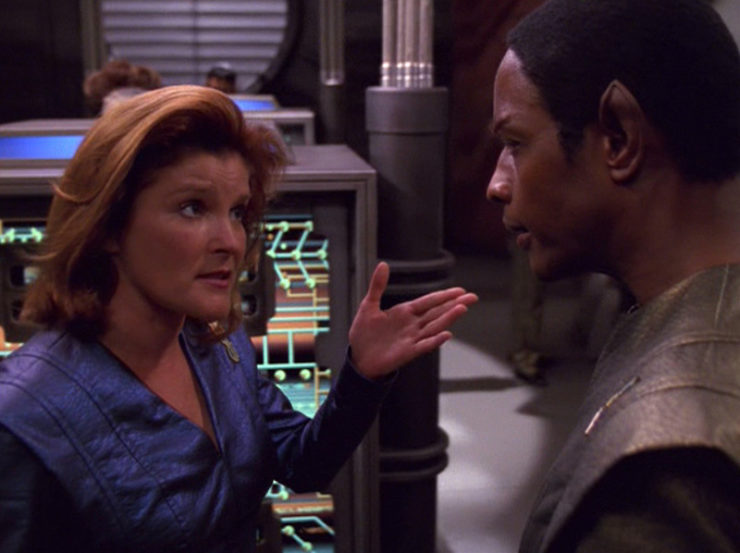
(I will give this season credit for making me realize that I don’t hate Paris anymore. I still don’t like him, and my absolute favorite thing this entire season is his being forced to take piloting lessons in “Natural Law.” The relationship with Torres has been really good for him.)
And then we have the rancid cherry on top of the mediocre sundae, the appalling “Endgame,” which fails on pretty much every level as a series finale.
One of my goals with this rewatch was to reconsider Voyager, which I did not enjoy when it first aired, and on which I pretty much gave up on early in season two, only going back and watching specific episodes I needed for research in Trek fiction I was writing.
Having rewatched the whole thing again over the past twenty-two months, I find myself on the one hand being very glad I watched and having truly enjoyed going through the show twice a week for the better part of two years—and on the other hand, having many of the same problems I had with it in the late 1990s…
Let’s start with the good. I totally get why so many young women growing up in the 1990s loved Janeway. For all that she was marginalized somewhat after the female co-creator of the show retired from being show-runner and was succeeded by two men, Kate Mulgrew still managed to instill her with an impressive charisma, a superlative sense of compassion and duty, and—for all that this was downplayed in the later seasons—a delightful science-nerdishness. She’s definitely worthy of joining the captain club with Kirk, Picard, and Sisko, and helps keep the bar set high for future members Archer, Lorca, Saru, Pike, Burnham, and Freeman.
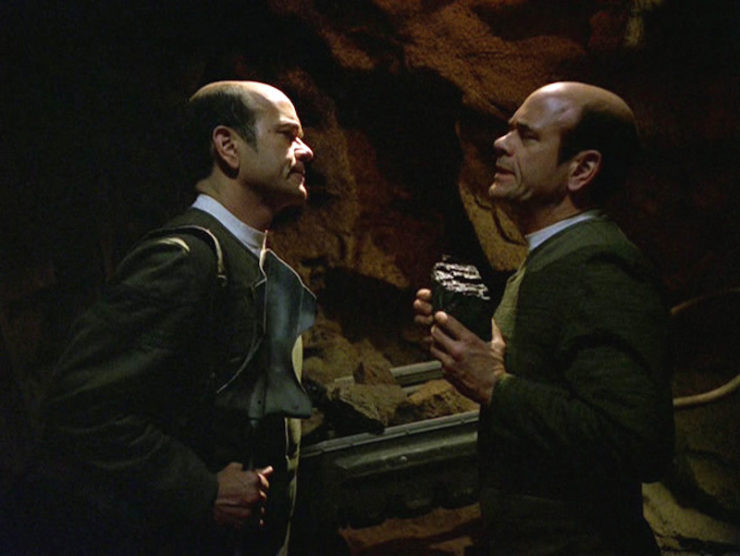
One hardly needs to mention the greatness of Robert Picardo, who became the breakout star of the show pretty much from the moment he first stated “Please state the nature of the medical emergency” in “Caretaker,” and Jeri Ryan, who took a part that could’ve been pure male-gaze awfulness and turned her into one of Trek‘s most complex characters (a characterization she has magnificently continued on Picard).
However, one needs to mention two other actors who don’t get anywhere near the credit they deserve: Roxann Dawson and Tim Russ.
More than anyone in this rewatch, Dawson impressed me with the complexity and personality she imbued Torres with, especially when given a spotlight. Some of the show’s best hours were ones that dug into Torres’s psyche and/or gave Dawson a chance to stretch herself, particularly “Prototype,” “Dreadnought,” “Remember,” “Extreme Risk,” “Juggernaut,” “Drive,” “The Killing Game” two-parter, the “Workforce” two-parter, “Day of Honor,” “Lineage,” “Author, Author,” to name but a few.
And Russ provides the best Vulcan we’ve gotten since Leonard Nimoy’s Spock, and up to this point he was arguably the only good one since Nimoy. (Jolene Blalock, Gary Graham, Zachary Quinto, and Ethan Peck have all done quite well as Vulcans since, however.) Russ brought a gravitas to the proceedings, giving Tuvok a complexity beyond the simple emotionless Vulcan. I especially loved how he was shown to be an excellent parent, teacher, and mentor, the former particularly in “Innocence” and the advice he gave to Paris in “Lineage,” the latter mainly in his work with both Kes and Torres. He also proved an able investigator (from “Ex Post Facto” to “Random Thoughts” to “Repression”) and a strong advocate (“Death Wish,” “Author, Author”). Russ perfectly combined the brilliance, the control, and, more than anything, the sass that is a critical part of any portrayal of a Vulcan.
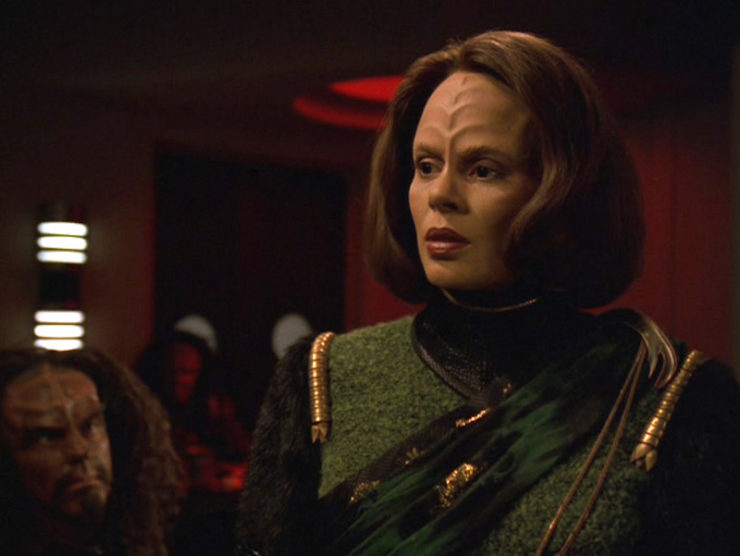
And yet the show was frustrating in how quickly it ran away from its premise. After setting up a ship struggling to find its way home with a mixed crew, they proceeded to spend seven years doing very little struggling, with none of the promised conflict between Starfleet and Maquis that Paramount spent most of 1994 hyping. Their attempts to do that conflict and that struggle were almost always failures.
Plus, a show like this really cried out for some manner of character arcs. While Voyager didn’t have to embrace a continuing story arc the way is predecessor DS9 did, there are a couple of cues it could—and arguably should—have taken from its sister show, most notably building a larger supporting cast. This is supposed to be the same 100+ people stuck in the same tin can for the entire run of the show, yet people outside the opening credits were barely acknowledged, and even the recurring supporting characters like Icheb and Naomi were barely a factor. “Redshirt” deaths have been an unfortunate part of Trek ever since Gary Mitchell strangled Lee Kelso in “Where No Man Has Gone Before,” but more than any other show, Voyager should never have had any kind of redshirt, because everyone on board the ship was literally irreplaceable. Each death should have had major consequences to the structure of the ship, with more people having to take on more tasks as the crew complement whittled down.
So many storytelling opportunities were not taken or not dealt with particularly well. Character developments would be provided and then ignored, whether it’s the events of “Tuvix” inexplicably having no effect on Tuvok and Neelix’s relationship to Kim learning the same coming-of-age lessons over and over again.
Having said that, once you accept what the show wasn’t, you can admire it for what it was: a good, if not great, science fiction show that, at its best, told some excellent stories. “Jetrel,” “Resistance,” “Before and After,” “Distant Origin,” “Living Witness,” “Nemesis,” “Bride of Chaotica!” “Gravity,” “Survival Instinct,” “One Small Step,” “Pathfinder,” “Memorial,” “Critical Care,” “The Void,” and the Hirogen trio of “Message in a Bottle,” “Hunters,” and “Prey” are some of Trek‘s finest hours. It gave us some worthy new alien species to explore, from the Ocampa to the Voth to the Hirogen to the Vaadwaur, among many others, it gave us Trek‘s first woman lead (and thankfully not its last), and it gave us the Captain Proton holodeck program which, let’s face it, is worth it all by itself…
Warp factor rating for the season: 5
Keith R.A. DeCandido urges everyone to be on the lookout for his reviews of Star Trek: Prodigy starting this coming Thursday as well as the Enterprise Rewatch, which will kick off in November.










